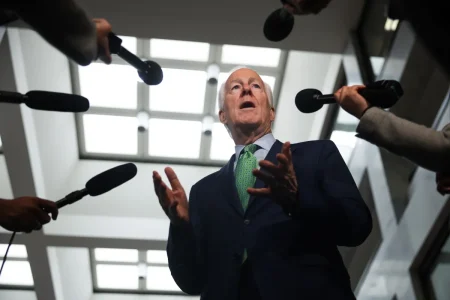Argentine President Milei Faces Electoral Setback Despite Trump’s Backing
In a significant political development, Argentine President Javier Milei has encountered a substantial electoral defeat in Buenos Aires province, raising questions about the sustainability of his radical economic reform agenda. The self-described “anarcho-capitalist” and close ally of former U.S. President Donald Trump saw his La Libertad Avanza party secure only 34 percent of the vote, substantially trailing the left-leaning Peronist opposition’s 47 percent. This defeat in Argentina’s most populous province serves as a potential warning sign ahead of the critical October 26 congressional midterms, where Milei desperately needs to expand his party’s minimal presence in the opposition-dominated Congress to advance his libertarian reforms. “We suffered a setback, and we must accept it responsibly,” Milei acknowledged to supporters, though he firmly declared, “There will be no retreat in government policy,” signaling his determination to continue his controversial economic program despite growing public discontent.
The electoral rebuke comes at a particularly challenging time for Milei, as he navigates not only economic turmoil but also a brewing corruption scandal involving his sister. This controversy has intensified public frustration, recently manifesting in a protest where demonstrators threw objects at the president’s vehicle during a rally, forcing him to leave early. Milei has dismissed the allegations as “the most rancid political tricks” while denying any wrongdoing, but the scandal has undoubtedly contributed to his waning popularity. The timing is especially problematic as Milei had been riding high on his close relationship with Donald Trump, who has expressed open admiration for the Argentine leader. In fact, Milei holds the distinction of being the first foreign leader to visit Mar-a-Lago following Trump’s 2024 election victory, highlighting their ideological alignment and personal rapport. Milei has also publicly praised Elon Musk’s efforts to help Trump secure the presidency, stating that the tech entrepreneur was going to “save humanity” – further cementing his position within the global right-wing populist movement.
Since taking office, Milei has implemented a series of sweeping austerity measures that have dramatically reshaped Argentina’s economic landscape. These include slashing energy and transport subsidies, laying off tens of thousands of government workers, freezing public infrastructure projects, and imposing wage and pension freezes below inflation rates. The immediate impact of these policies was predictably painful – unemployment rose, economic activity declined, and poverty surged across the country. However, Milei’s administration has pointed to several positive economic indicators as evidence of their approach’s success: monthly inflation has declined, leading to a rally in bonds and a strengthening of the currency. Argentina’s country-risk index has reached its lowest point in five years, while central bank reserves have hit their highest levels in two years, bolstered by International Monetary Fund credit. Perhaps most surprisingly, the gross domestic product has grown at rates that defied predictions from financial institutions – achievements Milei’s supporters consider vindication of his unorthodox economic strategy.
Despite these macroeconomic improvements, the reality for many Argentines remains harsh. Wages continue to stagnate at low levels while prices and poverty remain stubbornly high, creating a disconnect between statistical economic recovery and lived experience. This gap between economic data and everyday reality helps explain Milei’s electoral setback, as voters express their dissatisfaction with policies they perceive as disproportionately harmful to vulnerable populations. Axel Kicillof, the left-leaning governor of Buenos Aires province and one of Milei’s most vocal critics, captured this sentiment following the election results: “The ballot boxes told Milei that public works cannot be halted. They explained to him that retirees cannot be beaten, that people with disabilities cannot be abandoned.” Kicillof further emphasized, “The ballot boxes shouted that education, health care, science and culture cannot be defunded,” articulating the widespread concern that Milei’s austerity measures are dismantling essential social infrastructure rather than simply making government more efficient.
Looking ahead to the October 26 midterms, Milei faces a critical juncture in his presidency. With half of the Chamber of Deputies and a third of the Senate up for reelection, the vote will effectively serve as a referendum on his government’s performance thus far. For Milei, expanding his party’s tiny minority in Congress is not merely a political ambition but a necessity for implementing his radical libertarian reforms and fulfilling his promise to transform Argentina into a country capable of consistently servicing its debts – no small feat for a nation that has defaulted nine times. The recent electoral defeat suggests that Milei may need to recalibrate his approach to build broader support, possibly by mitigating some of his more severe austerity measures or addressing the corruption allegations more directly. His acknowledgment that “if we’ve made political mistakes, we’re going to internalize them, we’re going to process them, we’re going to modify our actions” indicates at least some recognition that adjustments may be necessary, even as he remains committed to his core economic principles.
The unfolding situation in Argentina represents a fascinating case study in the challenges facing populist economic reformers, particularly those who implement radical changes quickly. Milei’s close relationship with Trump and other global right-wing figures adds an international dimension to what might otherwise be viewed as a purely domestic political struggle. As Argentina moves toward the October midterms, the world will be watching to see whether Milei can recover from this setback and convince enough voters that short-term pain will lead to long-term prosperity, or whether the opposition’s message that his reforms are fundamentally unbalanced and unjust will prevail. The outcome will not only shape Argentina’s economic future but potentially influence the trajectory of similar movements worldwide that seek to dramatically reduce the state’s role in economic affairs. For now, Milei stands at a crossroads – determined to press forward with his vision despite growing signs that the Argentine people may be having second thoughts about the radical path he has chosen for their country.















